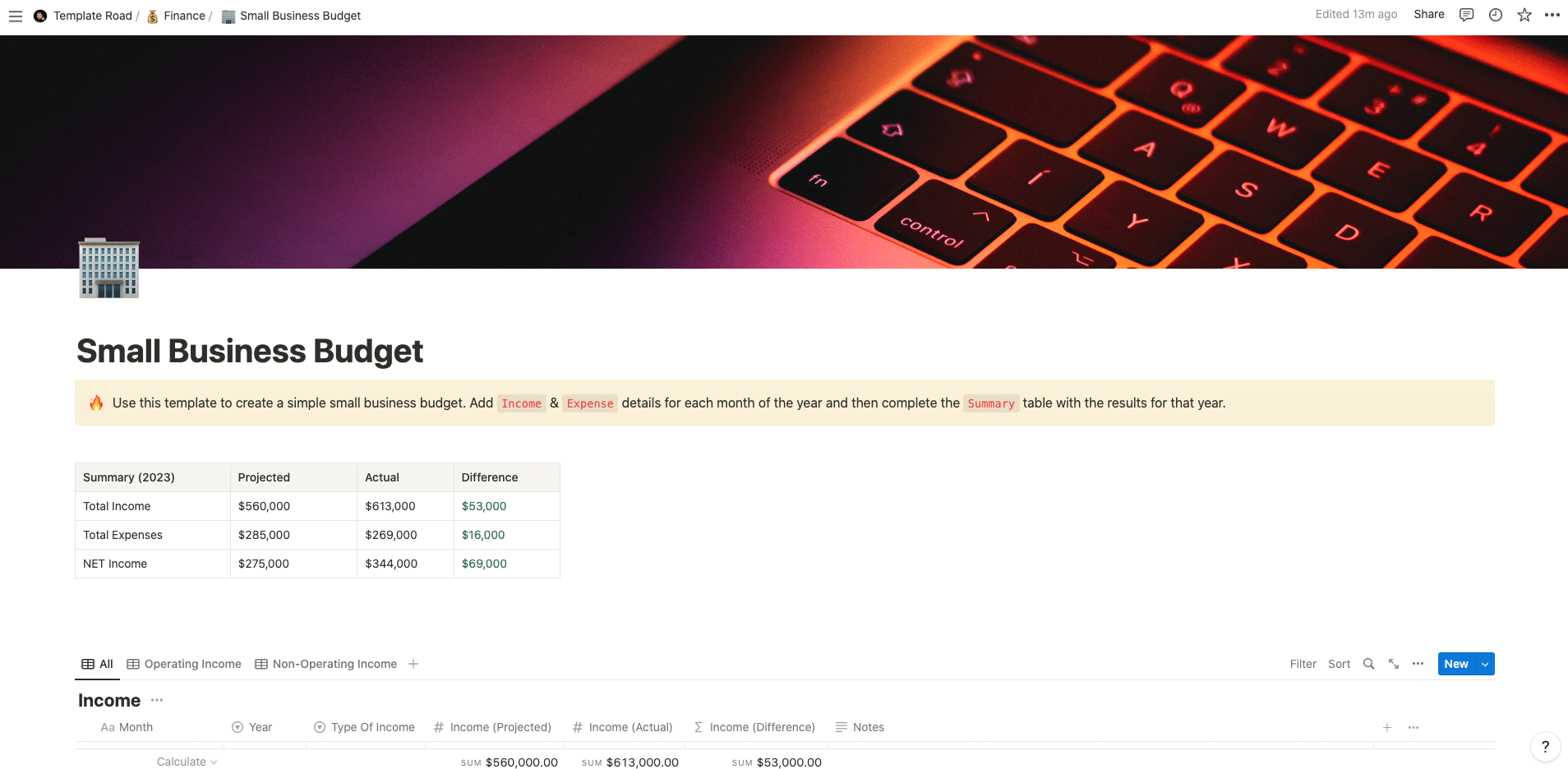Use this template to create a simple small business budget.
Buy on
Contents
Notion – Small Business Budget Template
Use this template to create a simple small business budget. Add Income & Expense details for each month of the year and then complete the Summary table with the results for that year. Take control of your business expenses with our business budget template. It’s the perfect tool for making strategic decisions that benefit your company. With this template, you’ll gain visibility into your overspending and areas that need cutbacks. You’ll also get a clear picture of your company’s overall health. Let us help you manage your finances so you can focus on growing your business.
——————————————
What you need before purchase
- Basic knowledge of how to use Notion
- Paid Notion account if you want to add lots of content to your template / Notion account (sign up here). Not much content? You’re able to use their free account.
After purchase, you’ll be able to view the template immediately. The template can be added to your Notion account by:
- Click on the template download link in Gumroad
- When viewing the Notion template, click on the “Duplicate” link in the top-right of your screen
- The template will now be available in your own Notion account
How to create a small business budget: Why do you need one?
A budget is an essential tool for any small business, as it allows you to plan ahead and allocate resources based on what is needed. Without a budget, you are likely to overspend or put yourself in financial trouble. Having a budget also helps build strong relationships with suppliers, lenders and customers.
The first step in creating a budget is to calculate your fixed costs, such as rent, insurance and salaries. These are costs that stay the same every month. Once you have these figured out, you can then estimate variable costs such as materials, advertising and travel expenses. Once you have all of this information, it’s time to create your budget.
The best way to start is by creating a spreadsheet with columns for income, fixed costs and variable costs. You can then adjust the amounts according to your expectations for the business in any given month or year. It is important to remember that estimates may not always be accurate so it’s important to review your budget on a regular basis and make adjustments as needed.
Finally, it’s important to keep track of all of your spending each month so you can compare it against your budgeted amount. This will give you insight into where money is being spent and also allow you to identify areas where savings could be made.
What makes a good budget?
A good budget should be realistic and achievable. It should also be flexible enough to account for unexpected expenses or changes in the market. Additionally, it should include a plan for saving money and for investing any extra funds back into the business. Finally, it is important to build in some sort of tracking system so that you can easily monitor your progress against your budgeted amounts. This will help you make adjustments if needed.
How much should a small business budget be?
When creating a budget for your small business, it is important to consider the size and scope of your operation. The amount you should allocate for different areas will depend on these factors. For example, if you are just starting out, you may want to spend more on advertising and marketing than if you have been in business for several years. Additionally, the size of your team and the type of services or products you offer will also affect the amount of money you allocate for certain expenses. Ultimately, the amount you budget for each area should be based on what is necessary to grow and sustain your business.
What should a small business budget include?
A small business budget should include all of the necessary expenses associated with running the business, such as rent, salaries, materials, advertising and marketing costs. It is important to consider the long-term goals for the business when creating your budget and allocate funds accordingly. Additionally, you may also want to consider setting aside funds for emergency expenses or unforeseen circumstances. A budget should be reviewed regularly to ensure it is up-to-date and accurate.
What is a good budget format?
A good budget format should be easy to read and understand. It should include a clear breakdown of income, expenses, and profit or loss. Each category should have its own column and all figures should be broken down by month so that you can track your progress over time. Additionally, it is important to include a summary section that clearly explains the total budget for the business, as well as any plans for saving or investing funds.
Where does budget information come from?
Budget information can come from a variety of sources. Business records, such as invoices and bank statements, are important sources of financial data. Additionally, industry research, market analysis and surveys can provide insight into expected expenses and income. Finally, it is also important to keep an eye on any changes in the economy that may affect your budget. This includes changes in taxes or interest rates that can affect the financial health of your business.















